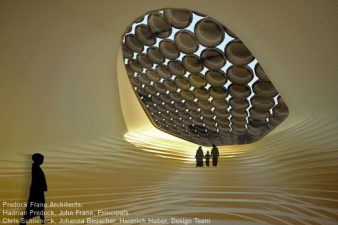 Founding director of Property Development at the Masdar Initiative, Khaled Awad claims that fuel and water subsidies preclude meaningful sustainable development.
Founding director of Property Development at the Masdar Initiative, Khaled Awad claims that fuel and water subsidies preclude meaningful sustainable development.
Green building won’t be viable until the United Arab Emirates end water and fuel subsidies, according to Khaled Awad. The founding director of Property Development at the Masdar Initiative and co-founder of Grenea, a Dubai-based startup that aims to develop zero-carbon zero-waste real estate communities around the world, Mr. Awad has offices near Jumeirah Beach in Dubai.
Overlooking the Burj Al Arab, a mesmerizing tower that resembles a sail, the quiet interior belies the bustle outside. What used to be a peaceful weekend getaway for Emiratis is now a metropolitan center full of only partially-occupied towers that devour water and energy. But this wasteful development model is at odds with a dismal reality. The oil boom is over, water is not plentiful, and climate change is real.
Grenea is currently working on a bid to develop sustainable social housing units for the Dubai municipality. Mr. Awad says this is an opportunity to demonstrate that net zero buildings are more than just an exercise in altruism and that they also save money. He added that like Masdar City outside of Abu Dhabi, this project could create a supply chain that will in turn drive down the cost of sustainable building materials.
But energy and water costs subsidized by government create a very real barrier to a more widespread green urban plan.
“At present, a green building and an “ungreen” building have the same value,” Mr. Awad said. But if subsidies are lifted and energy and water costs go up, then green building will seem considerably more attractive to residents interested in saving their hard-earned money.
A study sponsored by Abu Dhabi Distribution Co., Al Ain Distribution Co., and the Regulation and Supervision Bureau shows the discrepancies between local and expatriate water and energy expenditures. The average Emirati family consumes $308 worth of water compared to the average expatriate family that consumes only $49. Emirati families are not required to pay for their water at all, and some expat costs are also waived.
The same report shows that the average Emirati family consumes $760 worth of energy every month, but pay only $153. In contrast, expats consume $174 worth of energy, half of which is waived.
Government subsidies reduce the incentive to conserve resources. Last year several newspapers reported that the UAE were planning to end subsidies, but the recent Arab Spring has made that virtually impossible. Putting any additional stress on locals anywhere in the Arab world could incite unrest and is therefore politically untenable.
Mr. Awad believes the recent spread of discontent from Tunisia to Yemen may have set the UAE back by at least five years.
Not until subsidies are either reduced or altogether shut down will the local market embrace a widespread green paradigm shift. In the meantime, Grenea has set its sights on Malaysia, Turkey, and Montenegro, which countries are better poised to consider sustainable, zero carbon and zero waste development.
As for the cavernous towers? Mr. Awad says making them greener will require a massive cash infusion.
More on green building in the Middle East:
Foster & Partners Finish Gorgeous Green Building in Morrocco
Bring Moshe Safdie’s Green Building to the Middle East
Hassan Fathy is the Middle East’s Father of Sustainable Development
image via Construction Week Online




Thanks Jonathan. You’re right. If people are unaware or uncertain about climate change, the best way to reach them is through their wallet. I wonder if it would be possible to remove subsidies for the wealthy, but not for the poor? Maybe work on a sliding scale according to income?
Very well put, this explains the dichotomy that exists in the UAE that was prevalent in all optimistic green developments – the huge subsidies that don’t allow the incentives required to further develop resources.